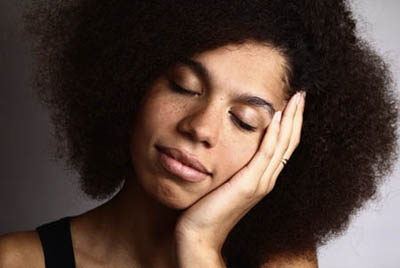

Dreams are another aspect of how we experience consciously. It you are programmed to interact in an environment of caucasian people, your dreams will reflect the same energies, as dreams for the most part are the way people work out their issues in physical reality.
If you are black, Asian, or of another racial background, your dreams will reflect those who you interact with - the possible exception - people in power and media. It's simple and makes total sense if you understand the nature of our consciousness hologram.
As to dreaming in color vs. black and white -- that's another matter. Color is supposed to represents a level of consciousness in which the dreamer is interacting. A black and white dream is either something in the distant future or another grid reality in which the dreamer is simply a momentary observer.
Dreams Do Discriminate: Racial Makeup Mimics Real Life Live Science - December 16, 2011
Here's a new version of the old question "Do you dream in color?" What color are the people in your dreams? A new study finds that the racial makeup of dreams tends to match up with the proportion of different races people run into in their daily lives. A person's own race matters as well, said study researcher Steve Hoekstra, a psychologist at Kansas Wesleyan University.
"If you are, say, a black student at a predominately white school in a predominately white community, yes, you dream more about whites than do other black people in other communities," Hoekstra told LiveScience. "But you also dream more about blacks than most people do in your same community."
The idea for the study quite literally came in a dream. Hoekstra's wife, Anne, noted in a lucid dreaming moment that there was an Asian person in the dream she was having. When she woke up, Anne, who is white, told her husband how odd it was that she didn't dream about Asian people more often, especially because she has an adopted sister who was born in Korea.
"We got to wondering: The race of people in dreams, to what degree does it reflect reality?" Hoekstra said. "Are people even aware of the race of people in their dreams, and if so, does it map onto either the racial composition of places where they live or to their own family?" [Why We Dream]
Black or white
Hoekstra investigated the question with the help of a couple undergraduate research assistants and a few photocopies of a brief dream survey. The researchers asked 66 students at the predominately white Kansas Wesleyan University to fill out the survey. Next, Hoekstra asked a colleague at the historically black Winston-Salem State University in North Carolina to have another 60 students at that school fill out the survey.
The students answered questions about the racial makeup of their waking life as well as their dreams. They were also asked how much television they watched, and which genre of shows, from comedy to sports to drama, they preferred. Mixed in were other questions about dreaming to obscure the purpose of the study and to prevent biased answers.
Remembering race
They found that real-life race does matter in the dream world: Individuals reported that the largest proportion of people in their dreams were of their own race. The racial makeup of people's dreams also tended to match the racial makeup of their daily lives. The findings were true of both blacks and whites, Hoekstra said. Asian and Hispanic participants showed similar patterns, but there were too few of those races in the study to draw firm statistical conclusions.
Television can apparently creep into dreams as well, Hoekstra said. People who watched more TV reported more blacks and fewer whites in their dreams. Preferences for sports and comedy programs, in particular, seemed linked to dreaming about more blacks, perhaps because those genres represent more black people than other shows.
"If you're living in a predominately white community that [TV] would be another place you would run into people of color," Hoekstra said.
The study, published online Nov. 28 in the journal Dreaming, was exploratory in nature, Hoesktra said, and more research would be necessary to fully understand the role of television in dreamland. It's also possible that people exhibit a sort of selective memory bias when reporting their dreams, he said, so that they fail to recall accurately which races populate their dreams.
Hoekstra isn't sure yet whether he'll follow up on the research, but if he does, he'll likely investigate the role of media more thoroughly, he said. Keeping a daily dream diary is also a more accurate way to record dreams as opposed to surveys after the fact, he added. The idea interests him, he said, because most people seem to take the racial composition of their dreams for granted. "That's what our participants were saying, 'Gosh, I hadn't really thought about it before,'" he said. "This was a harder task than they would have thought."